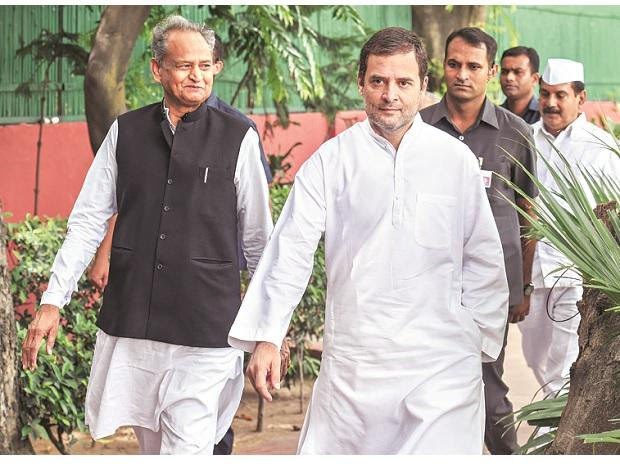Secularism dilemma: Congress won't
recover its 'chi' through soft-Hindutva
Bharat Bhushan
The Congress in
Madhya Pradesh is organising a “Ram Van Gaman Path Yatra”, a pilgrimage
following the mythical route taken by Lord Rama to his 14-year exile in
the forest. Maybe the Congress party
needs to stop and remember that MP is among the top five states in
terms of farmer suicides in India. It is also the state from which lit
the spark of the nationwide farmers’ agitation in June 2017 when six
protesting farmers were shot dead.
The
attempt to retrace the path of Lord Rama comes in the wake of party
president Rahul Gandhi’s trek to Mansarover to pay obeisance to Lord
Shiva, at his Mount Kailash abode. It is of a piece with his new routine
of temple-hopping in election-going states and the party spokesman’s
boast that Rahul Gandhi is a sacred-thread wearing Hindu, and the party has “Brahmin DNA”.
Such blatant claims to ‘Hindu-ness’ suggest that the party has not overcome its dilemma over secularism.With
every electoral defeat, a recurring fear surfaces in the party that by
upholding strong secular values it runs the danger of being seen as
pro-Muslim. By giving in to this apprehension it gets inevitably drawn
into playing on the home pitch of the Bharatiya Janata Party (BJP).
The Congress has made this mistake earlier and is heading towards it again.
The party’s electoral defeat took place in 1996 despite the soft Hindutva line
followed by Congress Prime Minister P V Narasimha Rao when he allowed
the demolition of the Babri Masjid in December 1992. Congress leader V N
Gadgil had blamed the debacle on the majority community viewing the
party as anti-Hindu and Muslims suspecting it of a Hindu bias.
N D Tiwari, Arjun Singh and K Natwar Singh split from the party in 1994, criticising Rao’s soft-Hindutva line
and calling for a return to Nehruvian ideals. However, the Congress
never developed a comprehensive critique of Rao over this issue.
Neither the soft-Hindutva that
facilitated the demolition of the Babri Masjid nor the return of
“pro-Muslim” leaders like Arjun Singh helped the party to win the next
election in 1998. Its tally increased by just one seat! Faintheartedness
in adopting a robust secularism proved fatal and paved the way for the Vajpayee-led BJP government in March 1998.
This was not the first flirtation of the Congress with soft-Hindutva. Both Indira Gandhi and Rajiv Gandhi had done so earlier.
In 1984 Rajiv Gandhi won
a stunning electoral victory after his mother’s assassination. A
“Muslim” issue stirred public life in 1985 with the Supreme Court
judgment on Shah Bano allowing her to claim maintenance from her
divorced husband beyond the 90-day “iddat” period prescribed under the
religious law.

Reacting
to the BJP’s allegations of “minority appeasement”, Rajiv Gandhi’s
government tried to play to the Hindu majority. Within two weeks of
upturning the Shah Bano judgment, the chief minister of Uttar Pradesh,
Bir Bahadur Singh, was persuaded to allow Hindu worship at the disputed
Babri Masjid site.
The
long-term political advantage of this ill-conceived act went not to the
Congress but to the BJP. It facilitated the mobilisation of a militant
Hinduism and a campaign for building a Ram temple at the disputed site.
Neither
the Muslim nor Hindu constituencies favoured the Congress in the next
election. The Congress lost more than half its seats. The BJP increased
its tally from a mere 2 to 85 on the Hindutva vote. The
Bofors issue carried the V P Singh-led National Front to power with 143
seats. Once again, both soft-Hindutva and ‘minority appeasement’ had
failed the Congress.
Indira Gandhi always
visited important temples in election-going states. This was for her a
ritual, not just electoral strategy. She became more devout after Sanjay
Gandhi’s accidental death, undertaking weekly fasts.
However,
she too began to flavour her nationalism with a Hindu idiom in the
years before her assassination. She launched the Vishwa Hindu Parishad’s
‘Ekatmata Yatra’ and inaugurated the Bharat Mata Temple at Haridwar
where the yatra ended, in 1983. Her loyalist, C M Stephen, declared:
“The wavelength of the Hindu culture and the Congress culture is the
same.” Less than six months before her assassination, Indira Gandhi assured
the majority Hindu community that “if there is injustice to them or if
they do not get their rights, then it would be dangerous to the
integrity of the country.” Indira Gandhi’s assassination meant that her
‘majority appeasement’ was never tested electorally.
Rahul Gandhi should
know that his inclusive Hinduism will never be able to beat the BJP at
this game. In today’s religious politics, the communal fractures are
more sharply pronounced. He should note that Narendra Modi earned his Hindutva spurs not in the Himalayas but in the Gujarat riots of 2002.
People
will see the Hindu symbolism of the Congress as being as bogus as the
claims of Hindutva advocates to “real secularism”. The Congress cannot
woo the Hindutva constituency or even ordinary Hindu voters by
propounding the “real meaning” of Hinduism. Nor can it woo Muslims
through symbolic appeasement by offering “chadars” at mazars and
mausoleums.
The Congress party must
analyse its electoral failures correctly. It might consider the
argument that the party lost in 2014 not because the voters perceived it
as being inadequately Hindu, but because Narendra Modi had
a better developmental narrative. The Congress narrative for 2019
cannot be based on sacred threads or its Hindu DNA. The party will find
its “chi” or life-force only by restoring secular issues such as
economic development, accountable governance, the farming sector crisis,
the problems of industrial workers, Dalits, tribals, and those
marginalised by educational, social and cultural backwardness, to their
rightful place on its political agenda. Otherwise, it is unlikely to
recover its “chi”.
The writer is a journalist based in Delhi


